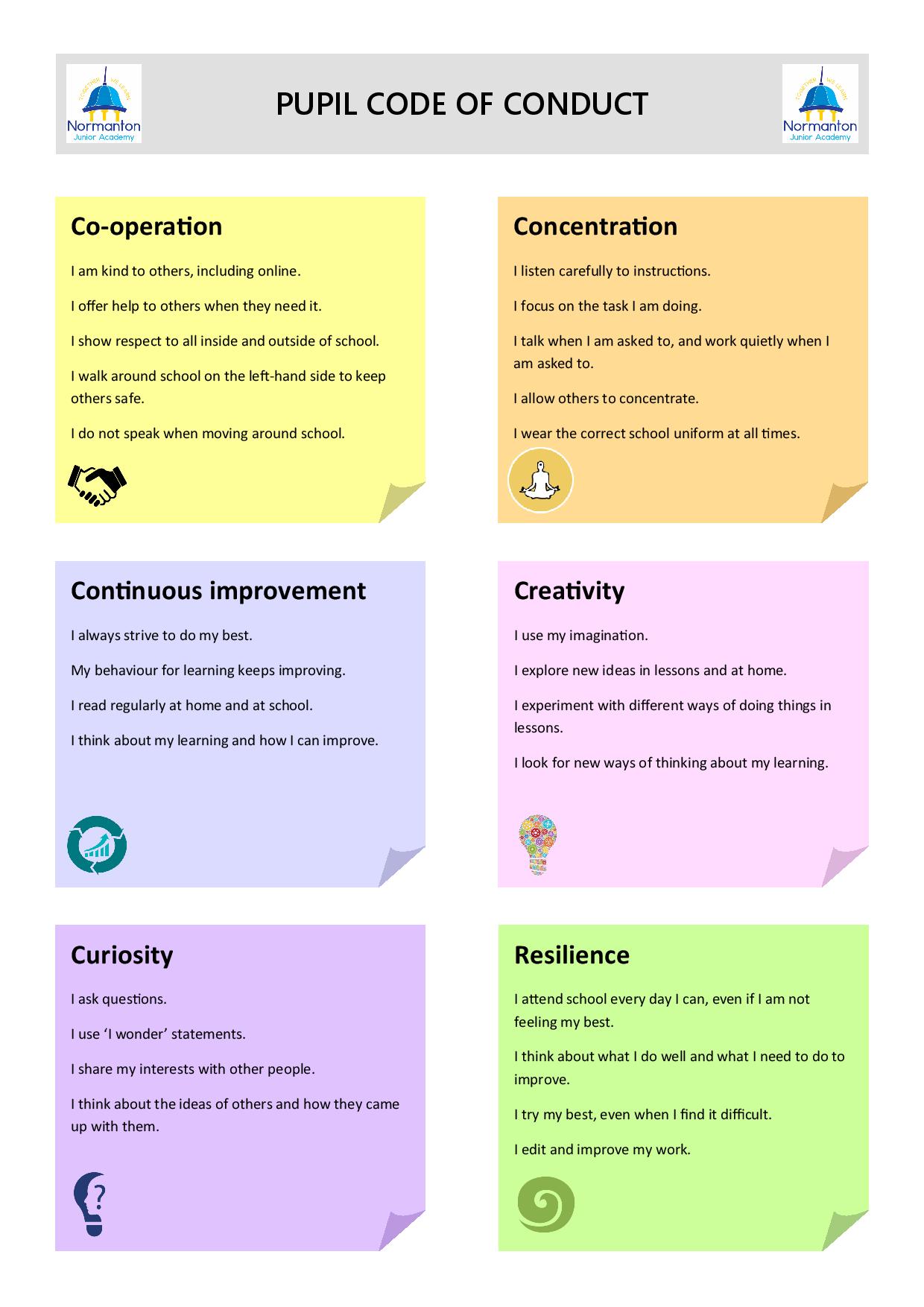Resilience – Continuous Improvement – Curiosity – Concentration – Co-operation – Creativity
Great behaviour is essential to ensure all pupils can learn in a safe, calm environment so that all pupils can thrive and achieve.
At Normanton Junior Academy, we promote the explicit teaching of successful learning and social behaviours, to ensure our community of learners are well-rounded citizens who have a positive impact upon society.
School Values: Learning Powers and Learning Behaviours
At Normanton Junior Academy, all learning experiences are underpinned by six learning powers that constitute our values:
- We are resilient
- We continuously improve
- We are curious about the world
- We concentrate on our learning
- We co-operate with all members of our community
- We think creatively
As a result of these values being lived, our children enjoy learning, know how to behave and become model citizens of our community and leave our school, ready, for the next stage of life and education.
At Normanton Junior Academy, we have high expectations of the behaviour of our community.
In support of our school motto, Together we Learn, pupils are given opportunities to acquire Learning Powers and demonstrate their accompanying Learning Behaviours.
The Learning Powers support children to display a positive learning attitude, thus enjoying their lifelong learning. The Learning Behaviours stipulate the behaviours expected to be able to learn. These are the values that all members of the community are required to demonstrate in order to thrive.

Each lesson, as well as during other curriculum activities and parts of the school day, pupils are taught both academic content and consider the appropriate Learning Behaviours, in order to learn the behaviour qualities required to find success in a task. It is our belief that once children have multiple experiences of all Learning Powers, and practiced their associated Learning Behaviours, all pupils will be empowered to enjoy any learning experiences offered throughout their lives.
These Learning Powers formulate a positive behaviour management system, underpinned by the principle that it is our duty to educate children on effective behaviour for lifelong learning. We afford all pupils the opportunity to build the skills required to be independent, successful citizens no matter the path they choose.
Behaviour for Learning and Mental Health
We recognise that behaviour is a form of communication. Further, we understand our role in educating pupils to acquire emotional literacy – helping them to understand how and why their emotions impact the choices they make. Like with all aspects of learning, some pupils will require more support in acquiring this understanding. Recognising the role of emotions and mental health in behaviour is of paramount importance as we seek to teach children the behaviours that will promote success in all aspects of their lives. Life will always present challenge, but we aim to equip our children with the skills to tackle such challenges healthily.
With this in mind, our RSE programme teaches all children approaches to mindfulness, regulating behaviour and emotions, how to take time reflect and how to take care of ourselves.
Further details of this can be found on the following pages –
- https://normantonjunioracademy.org/mental-health-wellbeing-at-nja/support-for-children/
- https://normantonjunioracademy.org/curriculum/relationship-sex-health-education-rse/
School Norms: Expectations, Rules and Routines
At Normanton Junior Academy, the learning community are expected to cooperate and demonstrate good social behaviour by being kind, safe and polite. This is modelled and promoted consistently by staff.
Pupils of the Pupil Leadership Team, supported by the Senior Leadership Team, formulated the Pupil Code of Conduct detailing the Normanton Junior Academy’s ‘norms’.

These behaviours are not explicitly rewarded by the school reward system as they are non-negotiables, expected and promoted by all members of the learning community, continuously, each day.
All expectations are linked to the Learning Powers which permeate Normanton Junior Academy. When pupils do not demonstrate our expectations, they are reminded of the Pupil Code of Conduct as part of the sanction system.
Great learning behaviour continues at home. Our children are capable of demonstrating the highest standards of learning behaviour, so we encourage and support our children to demonstrate a wider commitment to their lifelong learning at home and in school. Bronze, Silver and Gold behaviour passports for each year group are awarded to children who demonstrate the criteria listed. We have been particularly proud of the wider contributions our pupils have made to charity, as a result of these passports.
- Behaviour Passports – Year 3
- Behaviour Passports – Year 4
- Behaviour Passports – Year 5
- Behaviour Passports – Year 6
It is our responsibility to support children to make the right choices and to understand that actions have consequences – both positive and negative.
This system is a resource to support the teaching of Learning Behaviours rather than the extent of our policy, as we model and demonstrate behaviour through our words, actions, ethos and the learning experiences we offer. The creation of a rewards and sanction system seeks to ensure consistency and fairness for all within our school community, as we promote our Learning Powers.
Overview of Rewards
There are many ways in which pupils are rewarded for demonstrating their Learning Powers and Learning Behaviours and when encouraged to do the right thing. These include:
- The Recognition Board – children’s names are placed on the board for all to see, when they demonstrate the Learning Behaviour expected in a lesson. The class celebrate once all pupils’ names are on the board;
- Noticed at Normanton Junior Academy yellow wristband – children are given a wristband when their demonstration of the Learning Power is viewed as ‘over and above’ the Learning Behaviour expected;
- Noticed at Normanton Junior Academy Headteacher’s Award gold wristband – children are given a wristband when their demonstration of the Learning Power is viewed as ‘over and above’ the yellow wristband and requires the recognition of the Headteacher and/or Deputy Headteacher;
- Star of the Week – each teacher chooses two pupils who have excelled that week to receive a certificate in our weekly Celebration Assembly. These are then displayed in class for the following week;
- Tea Party Treat – children are chosen to attend a tea party when they have demonstrated consistent behaviour deemed as outstanding;
- Bronze, Silver and Gold badges – to empower children to make the best behaviour choices in many aspects of life, each child is given a passport to earn a badge for demonstrating a list of criteria, across each term, as outlined in Appendix 4;
- Membership of the Pupil Leadership Team – children who consistently demonstrate commitment to the school community are rewarded with privileges as Prefects, Sports Leaders or Head Boy and Head Girl in Year 6;
- Weekly and half-termly celebration assemblies noting wider achievements within and beyond the school community, including attendance and reading rewards.
Autumn Term – Awards Ceremony
this can be achieved in the Spring Term, AS WELL AS, achieving your silver! Let’s go!
Overview of Sanctions
The principles of restorative practice underpin our sanction system, as it is our duty to educate pupils to understand the wider consequences of negative behaviour choices. School firmly acknowledges that children make mistakes, as do adults, therefore it is our responsibility to build and develop a harmonious school community which manages conflict and tensions by repairing harm and building relationships. Staff will communicate expectations clearly, calmly and consistently using a script when all sanctions and restorative conversations are delivered. It is vital that formal sanctions are delivered privately from peers to prevent harm to relationships.
For children who consistently find it difficult to meet our high expectations, we will make reasonable adjustments, whilst the safety of all within our school community remains the highest priority. Every effort will be made to resolve conflicts positively and without harm to pupils or staff, property, buildings or the environment.
Some or all of the following approaches should be taken according to the circumstances of the incident:
- Reminder of behaviour expectations according to learning activity taking place;
- Verbal acknowledgement of unacceptable behaviour with request for the pupil to refrain;
- Further verbal reprimand signposting that this is the second request for compliance;
- Choice given to child with reminder of consequences should behaviour not improve;
- Time out to give pupil time to reflect upon behaviour choices, regulate emotions and prevent harm to relationships;
- An imposition imposed if the right choices are not made decided upon by a case-by-case basis;
- An explanation of why observed behaviour is unacceptable.
- Calm, soothe and settle approach, supported by the Pastoral Team when required.
- A restorative conversation must take place between the child and staff member after a sanction has been imposed.
- Parents informed of formal sanctions, that are recorded on the behaviour app, on the day that they have occurred.
- A C5 meeting, with parents/guardians, once a child has received 3 impositions in a term to target support for that child.
For pupils with additional needs, and for pupils who find it consistently challenging to meet our expectations, reasonable adjustments will be made to support their behaviour for learning. All pupils are expected to behave safely towards themselves and others within the school community, however, we are understanding that some pupils will need reasonable adjustments to achieve this.
A copy of the our Behaviour Policy, including other related policies, can be found by clicking here.




